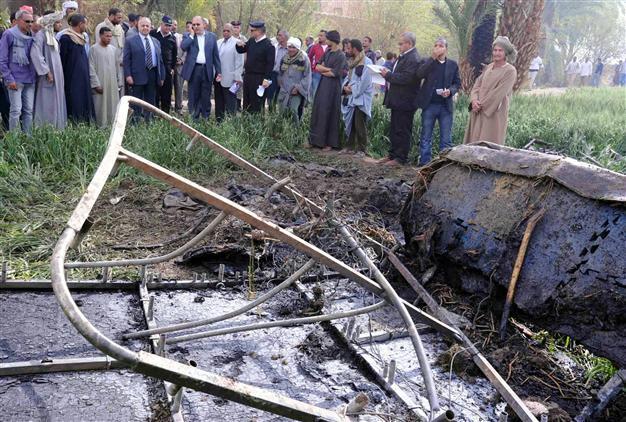Hot air balloons banned in Luxor after crash kills 19
CAIRO - Agence France-Presse

AA Photo
A hot air balloon exploded and plunged to earth at Egypt's ancient temple city of Luxor during a sunrise flight on Tuesday, killing up to 19 tourists, including Asians and Europeans, sources said.
The balloon carrying 21 people was flying at 300 metres (1,000 feet) when it caught fire, a security official said.
Security services cordoned off the scene of the crash in Luxor's dense sugar cane fields, as police and residents inspected the charred remains of the balloon.
The balloon had been floating over the west bank of Luxor, one of Egypt's most renowned archaeological sites and home to the famous Valley of the Kings and the grand Temple of Hatshepsut, when it exploded.
An Egyptian security official said 19 tourists from Hong Kong, Japan, Britain, France and Hungary had died in the crash.
Luxor Governor Ezzat Saad imposed an immediate ban on all hot air balloon flights in the province as Prime Minister Hesham Qandeel ordered an investigation into the accident.
Two French tourists were confirmed dead, the French foreign ministry said.
"I can confirm that sadly two of our citizens died in this accident," French foreign ministry spokesman Philippe Lalliot said in Paris. "We are in contact with their families." A British tour company said that two of its guests had also died in the crash.
"We can confirm that two of our guests are in local hospitals, but tragically two of our guests have died in the hot air balloon incident in Luxor, Egypt this morning," the company said in a statement.
The British Foreign Office would not confirm the death toll, saying only that "we believe a small number of British nationals are involved in an incident in Luxor this morning", and that consular staff were offering assistance.
Nine Hong Kong people and two Japanese were thought to be among the 19 killed.
"We believe that there is a high possibility that nine of our customers have died," said Raymond Ng, general manager of travel agency Kuoni, which organised the Hong Kongers' tour.
The five women and four men were aged between 33 and 62, Ng told a news conference in Hong Kong. Their relatives were to fly to Cairo later on Tuesday via Qatar, accompanied by three staff from Kuoni, he added.
The nine were among a group of 15 Hong Kongers who had left for Egypt on February 22. Ng said that according to local employees, the balloon caught fire about an hour after it had set off, plummeting to the ground two minutes later.
An employee at the company operating the balloon, Sky Cruise, said the pilot and one tourist survived by jumping out of the basket before it hit the ground. Both were taken to hospital.
"This is terrible, just terrible," the employee told AFP by telephone, declining to give her name. "We don't yet know what happened exactly or what went wrong," she said.
French hot air ballon expert Philippe Buron-Pilatre de Rozier said the blast could have been caused by a leak after a spark caused by a lighter or a cigarette.
Another reason could be wear and tear due to poor maintenance or if the pilot is badly positioned, said Buron-Pilatre de Rozier, adding that hot air balloons such as the ones used in Egypt are generally 40 metres (130 feet) high and can carry up to 25 passengers.
The Japanese embassy in Cairo said it was trying to confirm the reports that Japanese nationals died in the accident.
In 2009, 13 foreign tourists were injured when their hot air balloon hit a phone mast and crashed at Luxor. Sources at the time said the balloon was overcrowded.
The crash comes amid widespread anger over safety standards in Egypt following several deadly transport and construction accidents.
